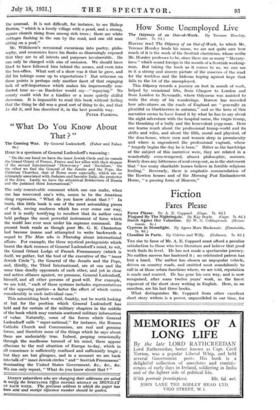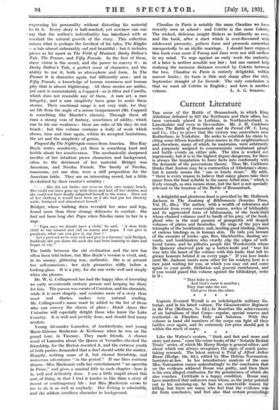Fiction
Fares Please
Fares Please. By A. E. Coppard. (Cape. 7s. f3d.) Claudine in Paris. By Colette and Willy. (Gollancz. 7s. ed. )
THE rise to fame of Mr. A. E. Coppard must afford a peculiar satisfaction to those who love literature and believe that good work finds its level. He has not made a spectacular journey. No sudden success has hastened it ; no celebrated patron has lent a hand. The author has chosen an unpopular vehicle, driven on country roads, and omitted most scandalously to call in at those urban functions where, we are told, reputation is made and marred. He has gone his own way, and is now recognized, after some twelve years' work, as the finest exponent of the short story writing in English. Here, in an omnibus, are his last three books.
What distinguishes Mr. Coppard from other excellent short story writers is a power, unparalleled in our time, for
expressing his personality without distorting his material to fit it. Every story is hall-marked, yet nOwhere can one
say that the author's individuality has interfered with or overlaid the natural growth of the story. This collection misses what is perhaps the loveliest of his tales, The Higgler —a tale almost unbearably sad and beautiful : but it includes pieces as far apart as The Field of Mustard, Darby Dallow's Tale, The Presser, and Fifty Pounds. In the first of these, sheer vision is the secret, and the power to convey it : in Darby Dallow's Tale, a perfect sense of character, and the ability to use it, both as atmosphere and form. In The Presser it is character again, but differently seen : and in Fifty Pounds, a knowledge of human meanness and human pity that is almost frightening. All these stories are unlike, yet each is unmistakably a Coppard—as is Olive and Camilla, which does not resemble any of them. A rare art, a rare integrity, and a rare simplicity have gone to make these stories. Their emotional range is not very wide, for they see life from the angle of a serene temperament (Mr. Coppard is something like Hamlet's cherub). Through them all runs a strong vein of fantasy, sometimes of oddity, which can be his one weakness : there are sides of life they do not touch : but this volume contains a body of work which shows, time and time again, within its accepted limitations, the art and the simplicity of genius.
Plagued By The Nightingale comes from America. Miss Kay Boyle writes sensitively, yet there is something hard and brittle about her sensitiveness. The mechanically sharpened needles of her intuition pierce characters and background, often to the detriment of her material. Bridget was American, and Nicolas French. The family of Nicolas, numerous, yet one clan, were a stiff proposition for the American bride. They are an interesting crowd, but a little devitalized by their creator's scrutiny :
" . . . She did not bathe, not even on their own isolate beach. She could not have gone up with them and laid off her clothes, and she could not have finally subjected herself to the water. Once out of her clothing it would have been as if she had put her identity aside, betrayed and abandoned herself."
Bridget, whose bathing dress revealed her arms and legs, found more than these strange delicacies to combat. She had not been long chez Papa when Nicolas came to 'her in a rage.
" Papa ,says says we- should have a child,' he said. ' A dear little child to rim 'around -and call us mama and papa. I can give it paralysis, what can you give it, my dear ? ' ' Let's pretend we're very rich and give it a fortune,' said Bridget. Suddenly she put down the sock she had been learning to darn and began to cry." -
The battle between the old civilization and the new has often been told before, but Miss Boyle's version is vivid, and, in its uneasy, glittering way, authentic. She is at present too self-conscious : her style pirouettes stiffly before a looking-glass. It is a pity, for she can write well and simply when she pleases.
Mr. W. G. Collingwood has had the happy idea of inventing an early seventeenth century parson and keeping his diary for him. The parson was curate of Coniston, and his chronicle, while it is more shapely, and contains more of a story than most real diaries, makes very natural reading.
Mr. Collingwood's name must be added to the list of those who can convey the charm of place : Dutch Agnes Her Valentine will especially delight those who know the Lake Country. It is well and prettily done, and should find many readers.
Young Alexander Lumsden, of Auchterlynie,- met young Marie-Etienne Rocheraie de Kerhouec when he was on the grand tour, in Tuscany. They made friends. A chance word of Lumsden about the Queen at Versailles checked the friendship, for the Breton resented it, and the extreme youth of both parties demanded that a duel should settle the matter.
Happily, nothing came of it, but eternal friendship, and numerous adventures " in the period." If one likes costume drama—Miss Mackenzie calls her entertainment " an operetta in Prose," and gives a musical title to each chapter—here it is, well and delicately done. I am a little stupid about this sort of thing, in that I find it harder to like than a story of recent or contemporary life : but Miss Mackenzie seems to me to do it as well as anybody. Her writing is admirable„ and she seldom sacrifices character to background. Claudine in Paris is notably the same Claudine we have recently seen at school : and Colette is the same Colette, The wicked, delicious insight flickers as brilliantly as ever, and the book, after a start which is over-flavoured with adolescent precocity, gathers force and proceeds somewhat unexpectedly to an idyllic marriage. I should have enjoyed this book even more if Fanny and Jane were not still mellow in my mind. To urge against an early work the maturity of a later is neither sensible nor fair ; but one cannot help realizing the immense distance covered by Colette between the two. Claudine in Paris is entirely delightful, within narrow limits ; its taste is thin and sharp after the rich, September draught of La Seconde.. The only conclusion is that we want all Colette in English ; and here is another



































 Previous page
Previous page